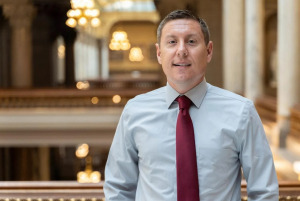
Trump downplays business concerns about uncertainty from his tariffs and prospect of higher prices
On Wall Street, it was a tough week with wild swings dominated by worries about the economy and uncertainty about Trump’s tariffs.

On Wall Street, it was a tough week with wild swings dominated by worries about the economy and uncertainty about Trump’s tariffs.

While forecasters largely expect the U.S. economy to lose some steam after a blockbuster 2023, a still-robust labor market and receding inflation continue to support mostly solid household demand.

Despite rising wages, voters as a group lost spending power during 2021 and 2022 due to inflation and high interest rates, and are still facing an uphill battle.

The comments from Indiana State Budget Director Zac Jackson came during a virtual panel discussion on the impacts an economic recession would have on state budgets.
Analysts say a “rolling recession” and what they call a “richcession” could help the economy as a whole manage to avoid a full-fledged recession.

A third of the economists who responded to the survey now expect a recession to begin in the April-June quarter. One-fifth think it will start in the July-September quarter.
An economic downturn is still possible. Yet in recent weeks, with inflation showing widespread signs of easing, a more cheerful view has gained traction: Maybe a recession isn’t inevitable after all.
Treasury Secretary Janet Yellen spoke just before a slew of economic reports will be released this week that will shed light on an economy currently besieged by rampant inflation and threatened by higher interest rates.
The latest inflation reading was supposed to offer hope that the U.S. economy had weathered the worst of the storm. But there was nothing reassuring in Wednesday’s report.
St. Louis Federal Reserve President James Bullard said he currently supports a 0.75 percentage point increase in the Fed’s benchmark short-term interest rate at its next meeting later this month.
Economic history suggests that aggressive, growth-killing rate hikes could be necessary to finally control inflation. And typically, that is a prescription for a recession.
Although major swaths of the economy—including the job market and consumer spending—remain robust, there are mounting worries that rising borrowing costs for consumers and businesses, after years of near-zero interest rates, could cause a sudden retrenchment.
Federal Reserve Chair Jerome Powell, fresh off winning confirmation for a second term, acknowledged for the first time Thursday that high inflation and economic weakness overseas could thwart his efforts to avoid causing a recession.
Treasury Secretary Janet Yellen said Thursday in an address at the Brookings Institution that countries need to build in “recession remedies” to protect people in the U.S. and globally going forward.
The “yield curve” is watched for clues to how the bond market is feeling about the U.S. economy’s long-term prospects. On Tuesday, a closely followed part of the yield curve gave investors some cause for concern.
Save what you can, think twice before rejecting a job offer, protect your credit but protect yourself first and more from Millennial Money.

In this first episode of IBJ’s Beyond COVID podcast, Matt Neff offers advice for businesses trying to get back on track. And IBJ reporter Lindsey Erdody provides an update about Indiana Gov. Eric Holcomb’s stay-at-home order and, in particular, how the latest iteration affects liquor stores.
A former Senate budget writer said the hit to the state budget could be bigger than during the Great Recession, when state revenue dropped 15% over two years.
Across the country, consumer spending—which supports 70% of the economy—is grinding to a halt as fears of the escalating coronavirus pandemic keep people from stores, restaurants, movie theaters and workplaces.
The nation’s business economists think President Donald Trump’s trade war with China will contribute to a sharp slowdown in economic growth this year and next, raising concerns about a possible recession starting late next year.